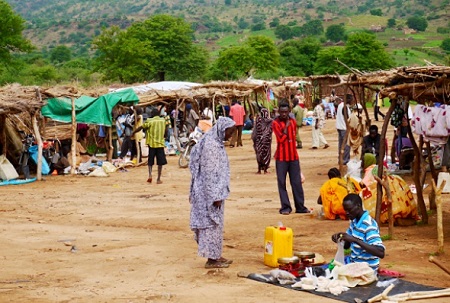A Call from Nuba Mountains

This article forms the second part of a two-part series. Following the problem statement in Land Times No. 19, this article focuses on the proposed solutions put forward by the Kushian Society for Development and Human Rights in light of the political changes taking place in Sudan.
The people of the land, victims, and grievances, in addition to experts and researchers, agree that redistricting the lands of Nuba Mountains is needed by rescinding the previous Sudanese regime’s newly enacted laws, as the only way to stop the bloodshed and uphold human rights in the region.
The land is the main focus of the conflicts in Sudan, and in the case of Nuba Mountains, new policies and practices are needed to manage the land and resolve conflicts. These measures include:
· The cancellation and renegotiation of all existing contracts, provided that a settlement and registration committee is established for these lands with ownership reverting to their people. There must be local committees established to register the lands according to the customs of the land-based people, especially after former President Omar al-Bashir recognized the importance of the Nuba Mountains Agricultural Corporation.
· Redistributing the arable land after registration, and agricultural collectives must be established with the help of experts for families, herders and livestock that cover small distances, so that the agricultural land is not harmed.
· Restructuring the civil administration and disassociating it from politics, while providing administrative functions and powers to establish justice among the people.
· Establishing and implementing a protocol/charter to address cultural and civil grievances.
· Respecting cultural specificity in a systematic and constitutional manner, covering:
o Land-use arrangements (for grazing) and water for nomadic people crossing international borders.
o Arrangements for the exploitation of shared water with the State of South Sudan.
o Establishing a large development program called The Strong Push Program, which is a strategic program for positive discrimination and driving development.
Restoring stability in the Nuba Mountains must be part of a regional approach in various fields of development and service (with the solidarity of patriots and globalists – in the Africa and global spheres) and with a budget estimated at no less than US$50 billion.
Agricultural and horticultural sector development requires:
· Unconventional development of social services to provide care and fight poverty, especially for widows, orphans and those who are stranded;
· Cash-transfer programs to fight poverty and integrate those affected by the civil war;
· Opening secure passage for the return of internally displaced persons under the auspices of the United Nations;
· Paving the way for the voluntary return of Nubian refugees around the world under the auspices of the United Nations and International Organization for Migration;
· Raising the efficiency of the social-service sector (education and health), with vertical and horizontal expansion;
· Increasing the capacity of, and reviving the private sector.
Interim challenges require concerted action in at least five policy areas:
1. Security:
· Stopping the war,
· Repairing and eliminating the effects of war,
· Disarming the militias and the pastoral tribes,
· Securing pastoral paths and agricultural borders.
2. Rehabilitation:
· Opening agricultural institutes in the region,
· Rehabilitation of lands,
· Qualifying human cadres and developing resources,
· Rehabilitation of idle projects.
3. Funding and capitalization:
o Import of agricultural machinery;
o Import seeds from outside the region to strengthen the seed stock after its destruction by the war;
o Provide capital with global security (International Monetary Fund, World Bank, United Nations Fund for Agricultural Development).
4. Water management:
· Water collection,
· Rehabilitation of dams,
· Mitigating the effects of drought by constructing and digging wells for irrigation and grazing.
5. Legal procedures:
· Repeal the law of the Ministry of Justice for the expropriation of lands from the Nuba people in the region,
· Return the expropriated and Islamic Endowment lands,
· Planning and land ownership.
Last Call
The situation of the land in Nuba Mountains has become catastrophic, and it is getting worse day by day. International and regional human rights organizations, including the Habitat International Coalition - Housing and Land Rights Network, are still raising the gravity of the situation in the Nuba Mountains and warning the international community of the urgency of this humanitarian catastrophe. The people of Nuba Mountains are still hoping for improvement look forward to a new dawn that returns them to a quiet life among their green farms in peace and security peace and security, rather than the recurring nightmare of past wars, displacement, hunger, and agricultural, scientific and economic underdevelopment.
We, of the Kushian Society for Development and Human Rights, demand urgent intervention of the international community to play its international cooperation and assistance role, especially aligned with the United Nations Agenda 2030 for sustainable development, which we see as an entry point to a brighter future with the winds of change and the new situation in Sudan.
Photo: A traditional market in Gidel, Nuba Mountains. Source: Ilona Eveleens.
|